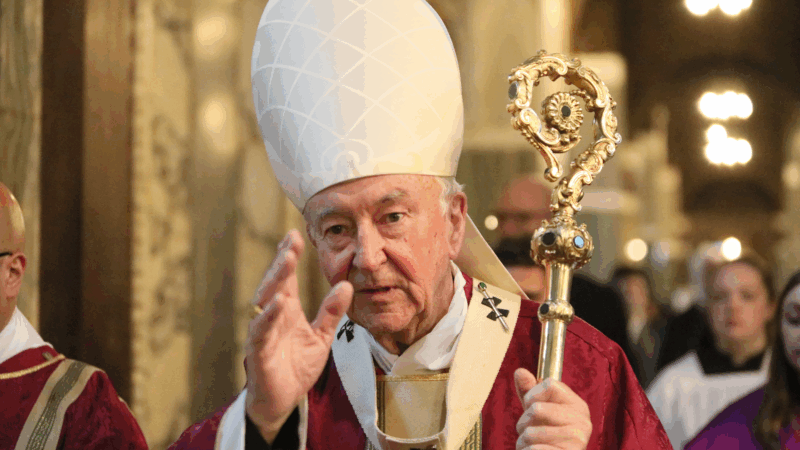Cardinal Vincent Nichols expects a ‘mood of reflection’ at his first conclave
ROME — Cardinal Vincent Nichols, the Catholic Church’s top official for England and Wales as the Archbishop of Westminster, is preparing to enter his first papal conclave. He says the task of choosing a new pope is “intimidating,” and expects a reflective mood as the cardinals gather inside the Vatican’s Sistine Chapel.
“When those doors shut, all of the speculation and way of talking about this as oppositional, you know, conservative against liberal and all of that stuff — that will finish, and there’ll be much more a mood of reflection,” Nichols told NPR.
Nichols, 79, was appointed cardinal by Pope Francis in February, 2014. He’s part of the most diverse College of Cardinals in his church’s history. Like Nichols, a majority of the voting cardinals (those under age 80) were appointed by Francis.
“I met this morning a cardinal from Rwanda… What he’s got to tell us! About a country like Rwanda and what it’s lived through and what the church is facing now. There’ll be a cardinal from Myanmar, from Burma… He’s living under a military dictatorship. So we’ve got to listen,” Nichols said. “In each of these places, the stories, the accounts, they make up the mosaic of the Church around the world.”

He says that the days in Rome leading up to the conclave are an opportunity for cardinals to listen to each other’s stories.
Nichols also acknowledged the importance of listening to survivors of sexual abuse in the church. He shared that he’s been meeting with victims for the past 20 years and called for the church to bring in outsiders to help them.
“I can’t take the pain away. I can try to understand it,” Nichols said. “Paradoxically, the church is the last place where they can get immediate help because we are the perpetrator.”
While Nichols doesn’t think he will come out of the conclave as the next leader of the Catholic Church, he says that the person who does will be making the ultimate sacrifice.
“I think being chosen pope is a mini kind of death,” Nichols told NPR. “Whoever is chosen pope will never go home again. They’ll lose every last vestige of privacy. His whole life will then be taken over — for good purpose… But it’s a kind of total surrender.”
During a conclave, cardinals are fully sequestered in the Casa Santa Marta, joined only by the nuns who run the house where Pope Francis lived. They are cut off from the outside, including television, radio, and cellphones. Nichols says he can get by without his podcasts, but missing out on soccer scores might be a little more difficult.
“I’m not quite sure what happens to my mobile phone… They might take them off us, I don’t know. Or they might block the signals. I have no idea. We’ll find out. But it’s my alarm clock. I’m worried I might be sleeping through [things]… and also your phone has got prayer on it that we use so it’ll be interesting.”
Nichols was told that the average length of a conclave is two or three days, but it can last as long as it takes until two-thirds of the cardinals participating agree on the new pope. He says he packed a few extra pairs of socks, just in case.
House Dem. Leader Jeffries responds to air strikes on Iran by U.S. and Israel
NPR's Emily Kwong speaks to House Minority Leader Hakeem Jeffries (D-NY), who is still calling for a vote on a war powers resolution following a wave of U.S.- and Israel-led airstrikes on Iran.
Iran’s Ayatollah Ali Khamenei is killed in Israeli strike, ending 36-year iron rule
Khamenei, the Islamic Republic's second supreme leader, has been killed. He had held power since 1989, guiding Iran through difficult times — and overseeing the violent suppression of dissent.
Found: The 19th century silent film that first captured a robot attack
A newly rediscovered 1897 short by famed French filmmaker Georges Méliès is being hailed as the first-ever depiction of a robot in cinema.
‘One year of failure.’ The Lancet slams RFK Jr.’s first year as health chief
In a scathing review, the top US medical journal's editorial board warned that the "destruction that Kennedy has wrought in 1 in office might take generations to repair."
Here’s how world leaders are reacting to the US-Israel strikes on Iran
Several leaders voiced support for the operation – but most, including those who stopped short of condemning it, called for restraint moving forward.
How could the U.S. strikes in Iran affect the world’s oil supply?
Despite sanctions, Iran is one of the world's major oil producers, with much of its crude exported to China.




